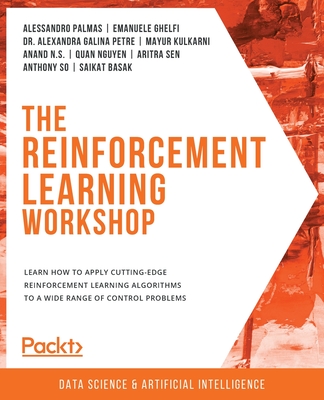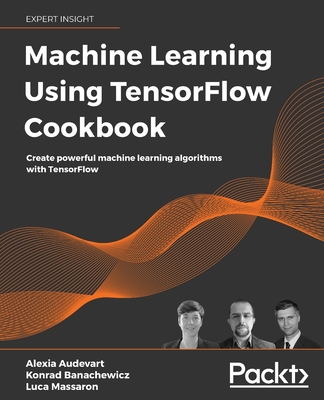Learn Unity ML-Agents – Fundamentals of Unity Machine Learning: Incorporate new powerful ML algorithms such as Deep Reinforcement Learning for games
暫譯: 學習 Unity ML-Agents – Unity 機器學習基礎:整合深度強化學習等新型強大機器學習演算法於遊戲中
Micheal Lanham
- 出版商: Packt Publishing
- 出版日期: 2018-06-29
- 售價: $1,330
- 貴賓價: 9.5 折 $1,264
- 語言: 英文
- 頁數: 204
- 裝訂: Paperback
- ISBN: 1789138132
- ISBN-13: 9781789138139
-
相關分類:
Reinforcement、遊戲設計 Game-design
海外代購書籍(需單獨結帳)
買這商品的人也買了...
-
 基礎資料結構 ─ 使用 C++ (Fundamentals of Data Structures in C++, 2/e)
基礎資料結構 ─ 使用 C++ (Fundamentals of Data Structures in C++, 2/e)$790$751 -
 愛上統計學, 3/e (Statistics for People Who Hate Statistics, 4/e)
愛上統計學, 3/e (Statistics for People Who Hate Statistics, 4/e)$520$468 -
 人人都是網站分析師|看穿網站流量的祕密
人人都是網站分析師|看穿網站流量的祕密$380$300 -
 Building an FPS Game with Unity (Paperback)
Building an FPS Game with Unity (Paperback)$1,820$1,729 -
 Unity AI Game Programming, 2/e (Paperback)
Unity AI Game Programming, 2/e (Paperback)$1,850$1,758 -
 資料科學的商業運用 (Data science for business)
資料科學的商業運用 (Data science for business)$680$537 -
 圖解!大數據下必學的統計基礎
圖解!大數據下必學的統計基礎$350$298 -
 工作一定要用到的統計:如何證明自己正確研判?別人的報告哪裡有破綻?產品熱賣是方法對了或只是湊巧?光有大數據還不夠,只有統計才能給你答案
工作一定要用到的統計:如何證明自己正確研判?別人的報告哪裡有破綻?產品熱賣是方法對了或只是湊巧?光有大數據還不夠,只有統計才能給你答案$340$289 -
 UX策略|設計讓人夢寐以求的創新數位產品 (UX Strategy: How to Devise Innovative Digital Products that People Want)
UX策略|設計讓人夢寐以求的創新數位產品 (UX Strategy: How to Devise Innovative Digital Products that People Want)$480$379 -
 Python 機器學習 (Python Machine Learning)
Python 機器學習 (Python Machine Learning)$580$452 -
 打動人心的產品設計|頂尖設計師打造成功產品的黃金法則 (Designing Products People Love: How Great Designers Create Successful Products)
打動人心的產品設計|頂尖設計師打造成功產品的黃金法則 (Designing Products People Love: How Great Designers Create Successful Products)$580$458 -
 Python 函式庫語法範例字典
Python 函式庫語法範例字典$450$383 -
 寫給 PM、RD 與設計師看的設計需求分析─使用者想要的應用程式都是這樣打造出來的 (Designing the Requirements: Building Applications that the User Wants and Needs)
寫給 PM、RD 與設計師看的設計需求分析─使用者想要的應用程式都是這樣打造出來的 (Designing the Requirements: Building Applications that the User Wants and Needs)$580$290 -
 機器學習 | 使用 Python 進行預測分析的基本技術
機器學習 | 使用 Python 進行預測分析的基本技術$580$493 -
 資料智慧化:利用資料科學,將資訊化為創見
資料智慧化:利用資料科學,將資訊化為創見$480$379 -
 3小時讀通基礎化學
3小時讀通基礎化學$320$272 -
 貝葉斯方法:概率編程與貝葉斯推斷 (Bayesian Methods for Hackers: Probabilistic Programming and Bayesian Inference)
貝葉斯方法:概率編程與貝葉斯推斷 (Bayesian Methods for Hackers: Probabilistic Programming and Bayesian Inference)$534$507 -
 Deep Learning|用 Python 進行深度學習的基礎理論實作
Deep Learning|用 Python 進行深度學習的基礎理論實作$580$458 -
 遊戲數據分析實戰
遊戲數據分析實戰$474$450 -
 Keras Reinforcement Learning Projects (Paperback)
Keras Reinforcement Learning Projects (Paperback)$2,000$1,900 -
 Python Reinforcement Learning Projects: Eight hands-on projects exploring reinforcement learning algorithms using TensorFlow (Paperback)
Python Reinforcement Learning Projects: Eight hands-on projects exploring reinforcement learning algorithms using TensorFlow (Paperback)$1,820$1,729
相關主題
商品描述
Transform games into environments using machine learning and Deep learning with Tensorflow, Keras, and Unity
Key Features
- Learn how to apply core machine learning concepts to your games with Unity
- Learn the Fundamentals of Reinforcement Learning and Q-Learning and apply them to your games
- Learn How to build multiple asynchronous agents and run them in a training scenario
Book Description
Unity Machine Learning agents allow researchers and developers to create games and simulations using the Unity Editor, which serves as an environment where intelligent agents can be trained with machine learning methods through a simple-to-use Python API.
This book takes you from the basics of Reinforcement and Q Learning to building Deep Recurrent Q-Network agents that cooperate or compete in a multi-agent ecosystem. You will start with the basics of Reinforcement Learning and how to apply it to problems. Then you will learn how to build self-learning advanced neural networks with Python and Keras/TensorFlow. From there you move o n to more advanced training scenarios where you will learn further innovative ways to train your network with A3C, imitation, and curriculum learning models. By the end of the book, you will have learned how to build more complex environments by building a cooperative and competitive multi-agent ecosystem.
What you will learn
- Develop Reinforcement and Deep Reinforcement Learning for games.
- Understand complex and advanced concepts of reinforcement learning and neural networks
- Explore various training strategies for cooperative and competitive agent development
- Adapt the basic script components of Academy, Agent, and Brain to be used with Q Learning.
- Enhance the Q Learning model with improved training strategies such as Greedy-Epsilon exploration
- Implement a simple NN with Keras and use it as an external brain in Unity
- Understand how to add LTSM blocks to an existing DQN
- Build multiple asynchronous agents and run them in a training scenario
Who This Book Is For
This book is intended for developers with an interest in using Machine learning algorithms to develop better games and simulations with Unity.
Table of Contents
- Introducing Machine Learning & ML-Agents
- The Bandit and Reinforcement Learning
- Deep Reinforcement Learning with Python
- Adding Agent Exploration and Memory
- Playing the Game
- Terrarium Revisited – Building A Multi-Agent Ecosystem
商品描述(中文翻譯)
**使用 Tensorflow、Keras 和 Unity 將遊戲轉換為環境,運用機器學習和深度學習**
#### 主要特點
- 學習如何將核心機器學習概念應用於 Unity 遊戲中
- 學習強化學習和 Q 學習的基本原理並將其應用於遊戲
- 學習如何構建多個非同步代理並在訓練場景中運行它們
#### 書籍描述
Unity 機器學習代理允許研究人員和開發者使用 Unity 編輯器創建遊戲和模擬,該編輯器作為一個環境,智能代理可以通過簡單易用的 Python API 使用機器學習方法進行訓練。
本書將帶您從強化學習和 Q 學習的基礎知識開始,逐步構建能在多代理生態系統中合作或競爭的深度遞歸 Q 網絡代理。您將從強化學習的基本概念及其在問題中的應用開始學習。接著,您將學習如何使用 Python 和 Keras/TensorFlow 構建自我學習的高級神經網絡。然後,您將進入更高級的訓練場景,學習使用 A3C、模仿學習和課程學習模型進一步創新地訓練您的網絡。到書籍結束時,您將學會如何通過構建合作和競爭的多代理生態系統來建立更複雜的環境。
#### 您將學到的內容
- 為遊戲開發強化學習和深度強化學習。
- 理解強化學習和神經網絡的複雜和高級概念
- 探索合作和競爭代理開發的各種訓練策略
- 調整 Academy、Agent 和 Brain 的基本腳本組件以用於 Q 學習。
- 通過改進的訓練策略(如 Greedy-Epsilon 探索)增強 Q 學習模型
- 使用 Keras 實現簡單的神經網絡並將其作為 Unity 中的外部大腦
- 理解如何將 LSTM 區塊添加到現有的 DQN 中
- 構建多個非同步代理並在訓練場景中運行它們
#### 本書適合誰
本書適合對使用機器學習算法開發更好的遊戲和模擬有興趣的開發者。
#### 目錄
1. 介紹機器學習與 ML-Agents
2. 強盜與強化學習
3. 使用 Python 的深度強化學習
4. 添加代理探索和記憶
5. 玩遊戲
6. 再訪 Terrarium – 構建多代理生態系統











